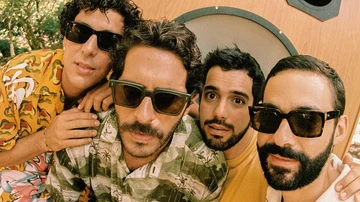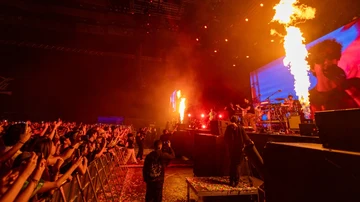Rawayana They are four high school friends who started making music as if among themselves and have become authors of hits that have conquered Latin America and the world. Alberto ‘Beto’ Montenegro, Antonio ‘Tony’ Casas, Andrés ‘Fofo’ Story and Alejandro ‘Abeja’ Abeijón They have conquered the world with their rhythms that fuse rock, soul, reggae, soul, r&b and Caribbean rhythms. They avoid labels but we could describe their music as a cocktail shaker (where everything fits) whose resulting mix is a Caribbean eclecticism that you want to drink.
We chatted with Beto, their vocalist and composer, minutes before their concert at the Wizink Center. He confesses to us that they are very excited. He was at the stadium two years ago watching Bon Iver and is looking forward to delighting his fans in this same venue. They welcome us walking through the hallways where photographs of the artists who have made history with their music hang and we greet them when they are leaving their signature and mark along with a thousand other postcards on that ‘walk of fame’ of the hallways that lead to the dressing rooms.
Ask. How did the Rawayana phenomenon come about since back in 2007 you started playing in clubs in a very turbulent Venezuela then governed by Chávez?
Answer. “It was a very chaotic context politically and socially.. We couldn’t even go to university because there were marches all the time. We were very against Chávez’s policies. So our music became like this place to take refuge. Precisely when we were looking for the name the band came to mind because it is an island in the Caribbean, it was like isolating ourselves from that situation we experienced that was a real nightmare. Although as a band we began to take off and already in 2010 with the publication of our first album, many leading artists invited us to play with them.”
Q. How does this political and social context affect a group that is emerging?
R. “We were openly anti-Chávez. We were growing and what happened is that we accompanied millions of people who were leaving the country who already knew us. We are probably the most important migration in Latin America. We all shared those obstacles with the immigration part and identity. So we become the soundtrack of that migration and that is how they send it to us. It’s hard to explain in a short conversation but it was an absolute nightmare.”

The members of the Venezuelan band Rawayana | Rawayana
Q. What obstacles did you have to overcome?
R. “We did not reach a Vive Latino because Venezuela, a powerhouse of crude oil for fuel, was left without electricity. There was no way to carry the equipment and we couldn’t go. At that time, also, coinciding with our first big tour, the government had practically everyone without the possibility of getting passports and we We had to go through all kinds of embassies and consulates to be able to serve our public abroad. Furthermore, the government waged a campaign against us to damage our image, a super important media attack.
Q. By the Chávez government?
R. “Yes, by a State entity. They blackmailed us with our identity and now I talk to you like this because time has passed but It was very painful. You have to think that They have kidnapped all of us in the gang, they have given us weapons, they have robbed us…To our collaborators, even the police themselves have taken them away. Because of all these things, people left Venezuela. In this context you were planning the tour and suddenly you realized that the airline was no longer working here, we lost all the logistics of the tour and it was very frustrating.”
Q. You recently staged another clash with the ruling party because Maduro used the chords of one of your songs without permission.
R. “Now there is a different reality that I honestly find difficult to understand. I suppose that the children of those in power listen to us, know the band, like it and that has been able to change the vision they have of us. It is as if Venezuela were a people’s farm and injustices continue. In this case they used our music without any permission and our team had to complain. “I think they were looking for our attention a little but they didn’t have it, we are not interested in these controversies.”
Q. To what extent has Spain been an inspiration for you, what about Spain in Rawayana?
R. “I wrote the last album precisely when I was able to stay for the first time to spend a few days in Madrid, experience the night, go out… For example, the song 911 is inspired by situations that happened here in the capital.”
Q. Which Spanish artist would you like to collaborate with?
R. “I really like C Tangana, I feel very identified with him from a creative point of view. Also Sen Senra, Marc Seguí, Bad Gyal and also with Rosalía, that we shared a nomination with her at the Latin Grammys that changed her career when she was not yet very famous. And look, from the classics, I would love to sing a duet with Raphael“.

Rawayana, live | Daniel Bailer
Q. In 2007 it occurred to you that today you were here filling a Wizink Center and on an international tour…
R. “The truth is that if, we dream big. Like the phrase that says: ‘be careful what you wish for because you’re going to get it’. We imagine tours and large stadiums. It’s nice when you surprise yourself by reaping what you sow., there are many people working behind to make this dream come true, but this is just the beginning. We are going to enjoy tonight.”
No sooner said than done. They enjoyed and made a very dedicated audience enjoy. They showed that they are the soundtrack of the diaspora that had to migrate. During two hours of recital, like true stage animals, they were the hosts of a great party. They performed live the sounds that cross the Latin American continent like a spine with touches of salsa, reggae, and even rumba. Their songs acted as a bridge that narrowed distances and allowed us to cross the pond to that homeland from which many of those present had to leave. His music, converted into the passport and flag that his compatriots wave with pride.
Source: Lasexta
Bruce is a talented author and journalist with a passion for entertainment . He currently works as a writer at the 247 News Agency, where he has established himself as a respected voice in the industry.











